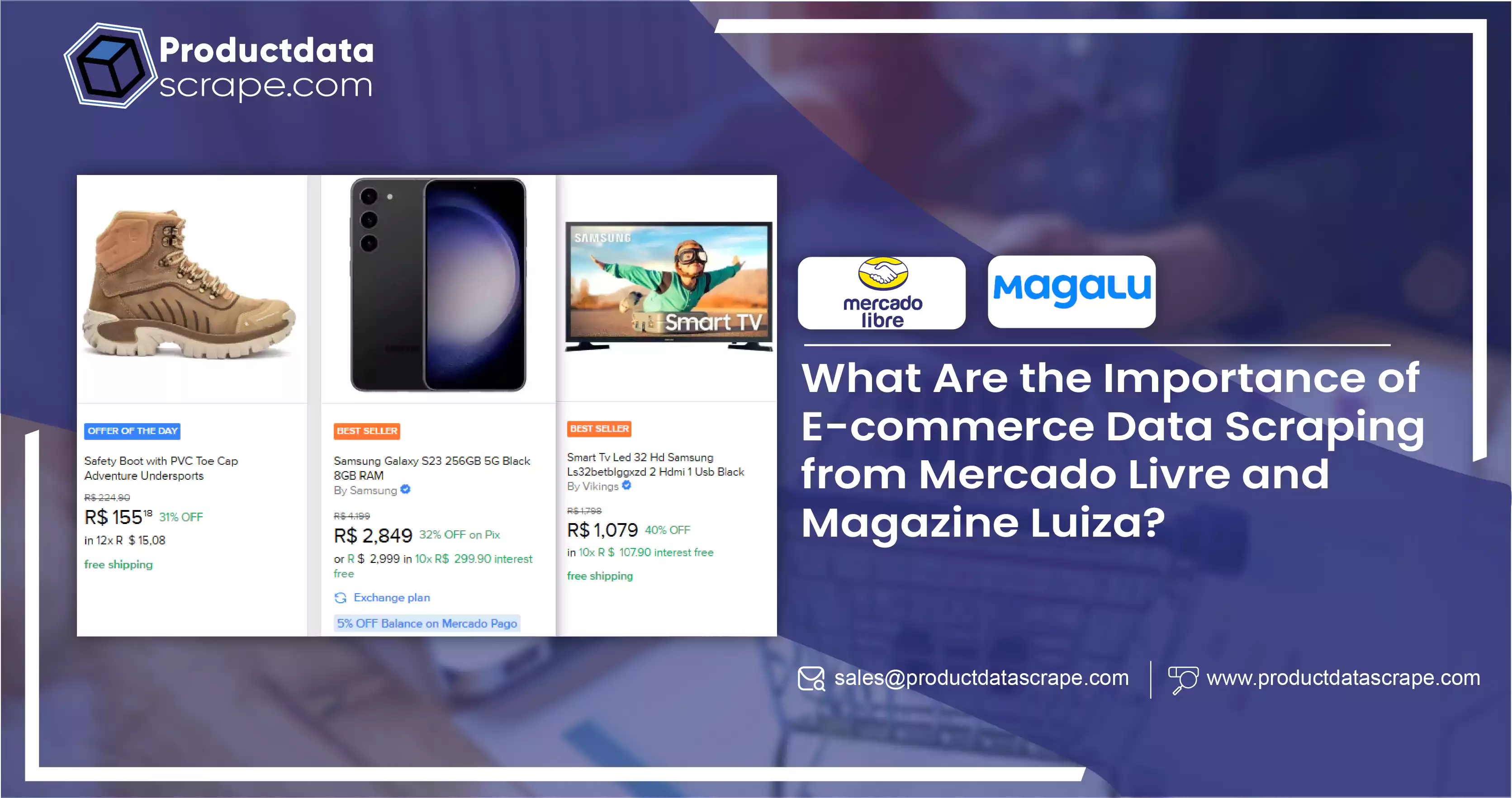
In the competitive world of e-commerce, businesses need access to real-time data to make informed decisions, optimize their strategies, and stay ahead of the competition. Web scraping has emerged as one of the most potent techniques for extracting large volumes of data from e-commerce platforms. Two prominent platforms in Brazil, Mercado Livre and Magazine Luiza, offer a wealth of product and market data that can be invaluable for businesses. This article will provide a detailed guide on E-commerce data scraping from Mercado Livre and Magazine Luiza. It will explore its importance, methods, challenges, legal considerations, and how businesses can use the data to improve their performance. Additionally, we will delve into the nuances of E-commerce data extraction for Mercado Livre and Magazine Luiza, outlining how businesses can leverage this valuable data to gain insights and optimize their operations.
Understanding Mercado Livre and Magazine Luiza
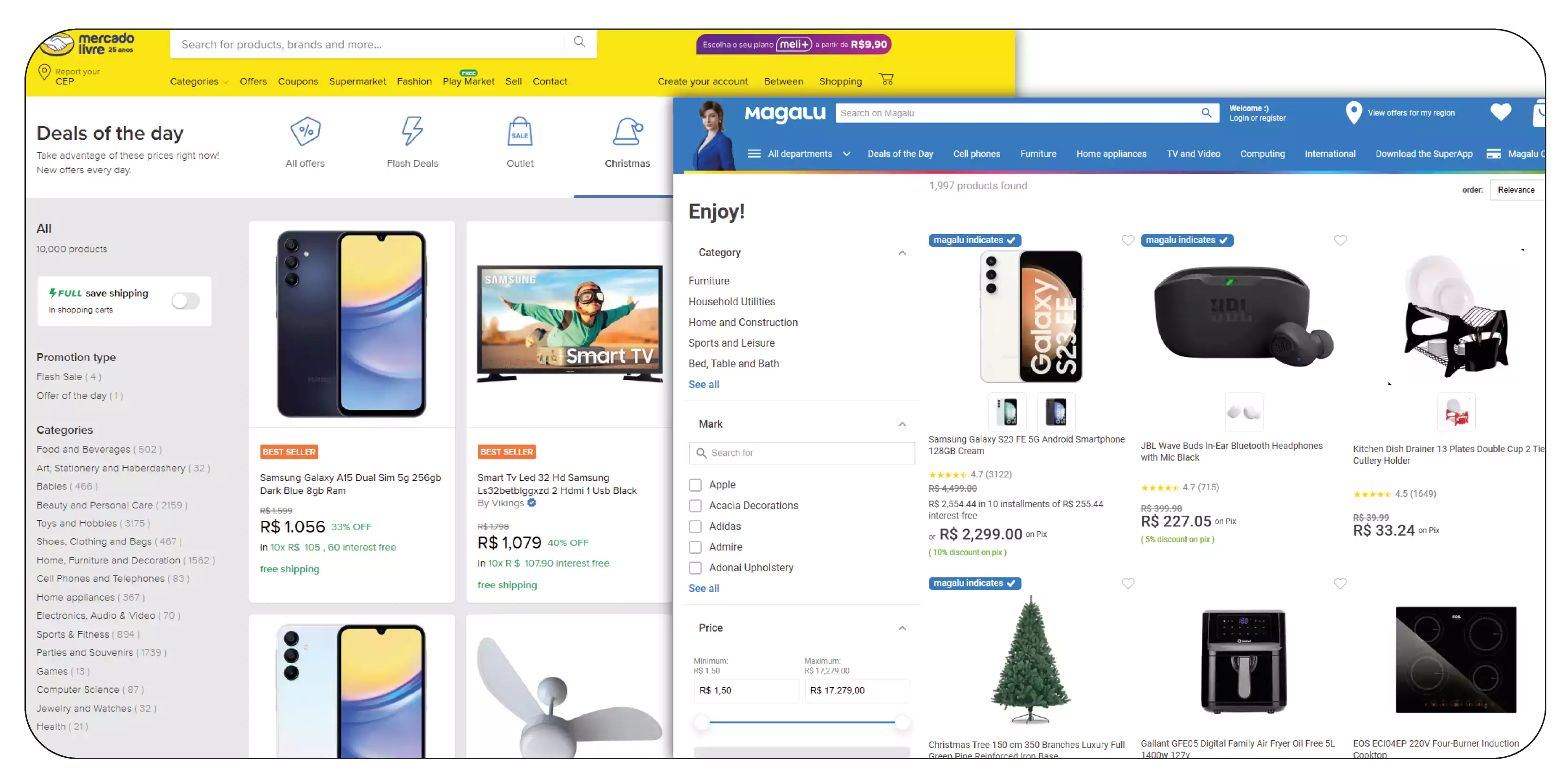
Mercado Livre: Mercado Livre is the leading e-commerce platform in Latin America, particularly popular in Brazil. It operates as an online marketplace that connects buyers and sellers, offering various products from electronics to fashion, home goods, and more. Mercado Livre also features a robust logistics system, payment processing, and other services, making it a comprehensive solution for sellers and buyers. As one of the largest platforms in Latin America, Mercado Livre's website provides valuable insights into consumer behavior, pricing trends, inventory management, and competitor analysis. E-commerce data scraping from Mercado Livre allows businesses to track these key metrics and gain a competitive edge in the market. Real-time product scraping from Mercado Livre enables businesses to monitor product availability, pricing shifts, and competitor listings, ensuring they can react quickly to market changes and optimize their sales strategies.
Magazine Luiza: Magazine Luiza, also known as Magalu, is one of Brazil's most well-known retail chains, operating both physical stores and an extensive online platform. It offers a broad product range, including electronics, home appliances, fashion, and more. The platform also features an integrated logistics system, online payment solutions, and delivery services. E-commerce data scraping from Magazine Luiza can help businesses monitor product listings, pricing, and sales performance, enabling them to optimize their operations and stay competitive in Brazil's retail market. With Real-time product scraping from Magazine Luiza, companies can stay on top of pricing trends, inventory levels, and new product releases, improving their decision-making process and strategic planning.
Importance of Mercado Livre and Magazine Luiza E-commerce Data Scraping
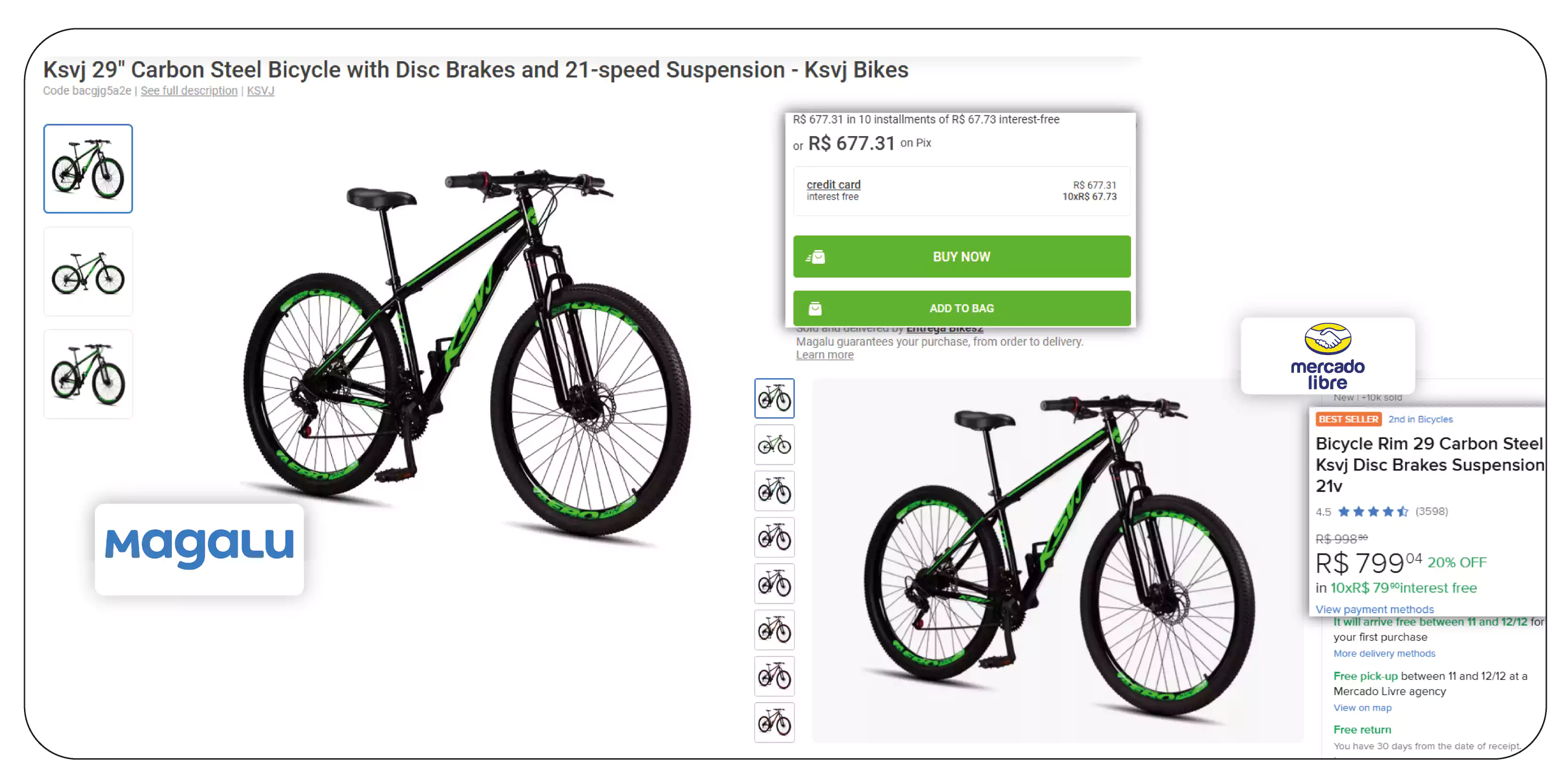
E-commerce data scraping is essential for businesses looking to improve their market strategies and operational efficiency. Here's why scraping data from platforms like Mercado Livre and Magazine Luiza is so essential:
1. Competitive Analysis: Scraping data from e-commerce platforms enables businesses to monitor competitors' listings, pricing, promotions, and stock levels. With this data, companies can identify competitive advantages, assess how competitors are positioning their products, and adjust their strategies accordingly. Whether adjusting pricing to stay competitive or launching new promotions based on competitors' moves, scraped data gives businesses the necessary insights. The Mercado Livre and Magazine Luiza data collection service helps businesses access this crucial competitive information.
2. Pricing Optimization: E-commerce platforms often feature dynamic pricing, where prices fluctuate based on demand, stock levels, and competitor pricing. By scraping Mercado Livre and Magazine Luiza regularly, businesses can track price changes in real-time, enabling them to optimize their own pricing strategies. This helps ensure products are competitively priced while maximizing profitability. Businesses can efficiently monitor price changes and adjust strategies in real-time using a Mercado Livre data scraping service.
3. Market Research: Data scraping allows businesses to gather product information such as descriptions, images, features, and customer reviews. This data can be used to identify market trends, consumer preferences, and new product categories. It also helps analyze the performance of various products in different segments, allowing businesses to make data-driven decisions. A Magazine Luiza data extraction service can provide comprehensive data for strategic market research.
4. Inventory Management: Scraping product availability data from Mercado Livre and Magazine Luiza helps businesses monitor inventory levels, ensuring they know of stock shortages or overstocked items. This real-time data helps businesses maintain optimal stock levels, reducing the risk of lost sales due to out-of-stock items or unnecessary overstock. Web scraping e-commerce websites for inventory data ensures businesses can respond quickly to changes in stock and avoid costly mistakes.
Critical Techniques for E-commerce Data Scraping from Mercado Livre and Magazine Luiza
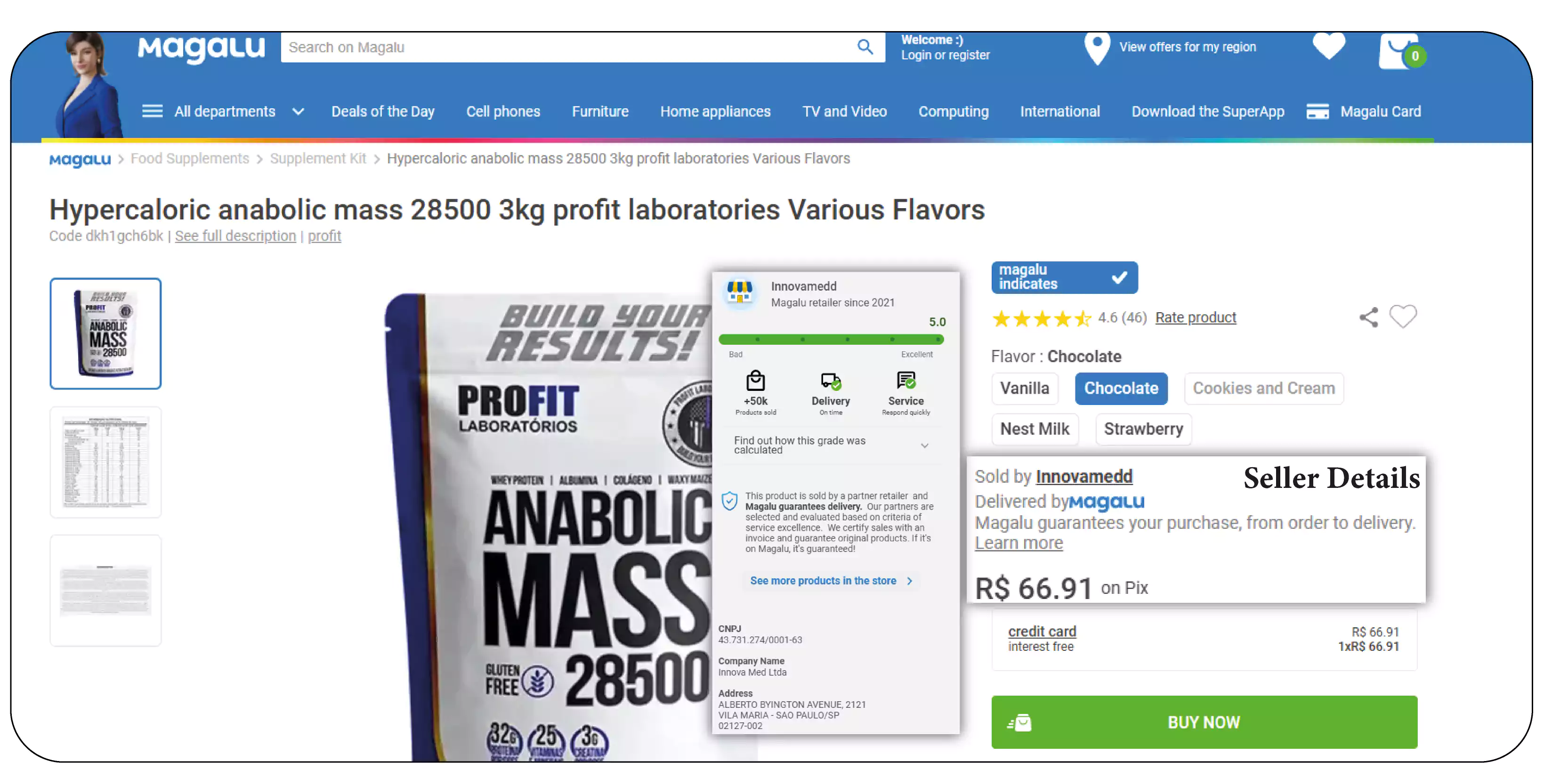
Businesses must follow effective methods and use appropriate tools to scrape data from platforms like Mercado Livre and Magazine Luiza. Below are the steps involved in the scraping process:
1. Identifying Data Points:
Before starting the scraping process, it's essential to identify the specific data points businesses wish to collect. For Mercado Livre and Magazine Luiza, key data points may include:
- Product titles and descriptions
- Pricing information (current, historical, and discounted prices)
- Customer ratings and reviews
- Seller details (name, ratings, feedback)
- Stock availability and shipping details
- Product images and videos
2. Using Scraping Tools:
There are several tools and libraries available for web scraping, such as:
- BeautifulSoup: A Python library that allows easy data extraction from HTML documents.
- Selenium: A browser automation tool that can interact with JavaScript-heavy websites and scrape data.
- Scrapy: A popular web crawling and scraping framework with more advanced capabilities.
Using these tools, businesses can programmatically extract data from Mercado Livre and Magazine Luiza by targeting the specific HTML elements that contain the relevant information.
3. Handling Pagination and Dynamic Content:
Mercado Livre and Magazine Luiza feature multiple product listing pages, and dynamic content (such as price changes) can load based on user interaction or time. Scraping such platforms requires businesses to manage pagination effectively and capture all relevant data across multiple pages.
To load more data, tools like Selenium can help handle dynamic content by simulating user interactions, such as scrolling and clicking buttons.
4. Data Cleaning and Structuring:
Once data is scraped, cleaning and structuring it for analysis is essential. Raw data may contain irrelevant or duplicate information, missing values, or formatting issues. Cleaning the data helps extract meaningful insights and ensures its usability in analytics and reporting.
5. Automating the Process:
For continuous data scraping, businesses can set up automated systems that run scraping scripts on a scheduled basis. This ensures that data is regularly updated, which is especially important for monitoring real-time pricing, stock levels, and competitor activity.
Challenges of E-commerce Data Scraping

While e-commerce data scraping offers many advantages, it also presents several challenges:
1. Legal and Ethical Considerations:
Web scraping is subject to legal regulations, especially regarding data privacy and intellectual property. Both Mercado Livre and Magazine Luiza have terms of service that govern the use of their data, and businesses must ensure they comply with these policies. Violating terms can lead to penalties, legal action, or being blocked from the platform.
To mitigate legal risks, businesses should:
- Review the platform's terms of service
- Scrape data in a way that does not overload the platform's servers
- Consider using official APIs, where available, to ensure compliant data collection
- Obtain permission for large-scale data scraping if necessary
2. Anti-Scraping Measures:
Many e-commerce platforms, including Mercado Livre and Magazine Luiza, implement anti-scraping measures to protect their data. These measures can include CAPTCHA challenges, IP blocking, rate-limiting, or detecting unusual activity patterns.
To overcome these barriers, businesses can:
- Use rotating IP addresses and proxies to avoid IP blocks
- Implement CAPTCHA-solving tools or services
- Use headless browsers (e.g., Puppeteer) to mimic human browsing behavior
3. Data Quality and Accuracy:
The quality of the scraped data can vary based on factors like the accuracy of the scraping scripts, website structure changes, and product information inconsistencies. Regularly monitoring and updating scraping scripts is essential to ensure data accuracy.
4. Managing Large Volumes of Data:
E-commerce platforms like Mercado Livre and Magazine Luiza contain vast amounts of data. Scraping large volumes of data can be resource-intensive and require significant storage and processing capacity. Implementing scalable data storage solutions, such as cloud storage or databases, is crucial for managing large datasets efficiently.
Legal Considerations for Scraping Mercado Livre and Magazine Luiza
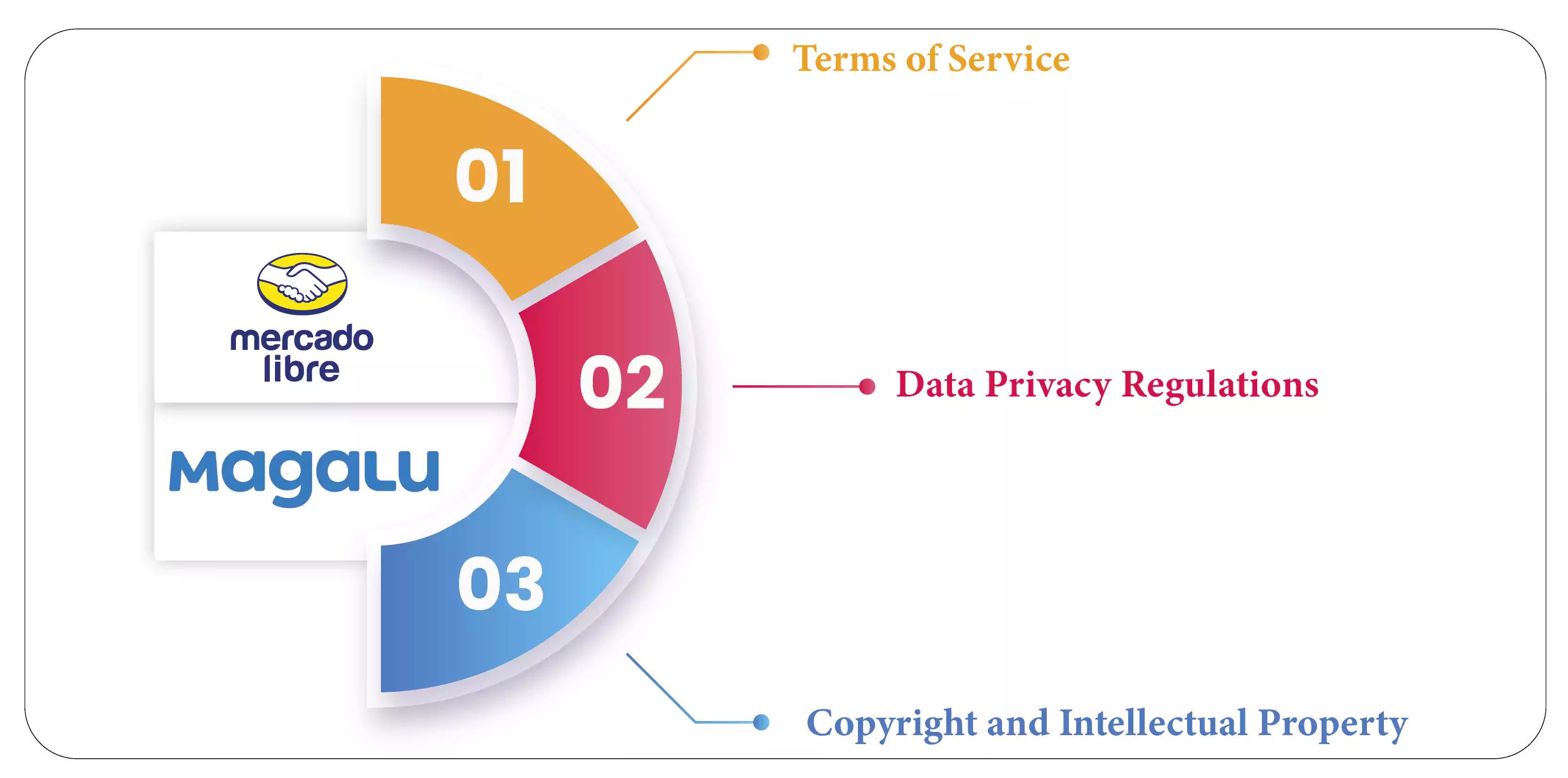
When scraping data from any e-commerce platform, businesses must be mindful of the legal implications. Below are some key considerations:
1. Terms of Service:
Mercado Livre and Magazine Luiza have clear terms of service that regulate the use of their data. Businesses should thoroughly read these terms to understand any restrictions on data scraping and ensure compliance.
2. Data Privacy Regulations:
Web scraping must comply with data protection laws, such as Brazil's Lei Geral de Proteção de Dados (LGPD), which regulates personal data collection, processing, and storage. Businesses should avoid scraping sensitive customer data or using scraped data in ways that could violate privacy laws.
3. Copyright and Intellectual Property:
Scraping data that is copyrighted or protected by intellectual property laws, such as product images, descriptions, or trademarks, could lead to legal challenges. Businesses should ensure they are scraping data in a way that does not infringe on these rights.
Conclusion
E-commerce data scraping from platforms like Mercado Livre and Magazine Luiza offers numerous benefits for businesses looking to optimize their strategies, enhance competitive intelligence, and improve pricing, inventory, and customer engagement. However, the process requires careful planning, the right tools, and adherence to legal guidelines to ensure success. Businesses can unlock valuable insights from these platforms by using the proper scraping techniques, automating the process, and overcoming the challenges of anti-scraping measures. Whether tracking price monitoring, analyzing product offerings, or gathering market trends, eCommerce dataset scraping can provide a strategic advantage in the fast-paced world of e-commerce. Additionally, data scraping helps businesses fine-tune their pricing strategies by providing real-time data to adjust pricing based on competitor moves and market demand.
At Product Data Scrape, we strongly emphasize ethical practices across all our services, including Competitor Price Monitoring and Mobile App Data Scraping. Our commitment to transparency and integrity is at the heart of everything we do. With a global presence and a focus on personalized solutions, we aim to exceed client expectations and drive success in data analytics. Our dedication to ethical principles ensures that our operations are both responsible and effective.
































.webp)






